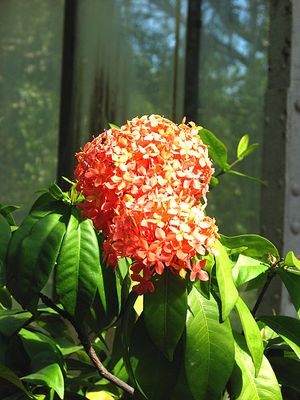Note: This is a project under development. The articles on this wiki are just being initiated and broadly incomplete. You can Help creating new pages.
Difference between revisions of "Ixora coccinea - Bandhujivaka"
(→Commonly seen growing in areas) |
(→References) |
||
| Line 58: | Line 58: | ||
<references> | <references> | ||
| − | <ref name="Leaf">[http:// | + | <ref name="Leaf">[http://www.efloraofgandhinagar.in/shrub/ixora-coccinea "e-flora"]</ref> |
<ref name="How to plant/cultivate">[http://tropical.theferns.info/viewtropical.php?id=Ixora+coccinea "practical plants"]</ref> | <ref name="How to plant/cultivate">[http://tropical.theferns.info/viewtropical.php?id=Ixora+coccinea "practical plants"]</ref> | ||
</references> | </references> | ||
Revision as of 13:03, 12 April 2018
Ixora coccinea (also known as jungle geranium, flame of the woods or jungle flame) is a species of flowering plant in the Rubiaceae family. It is a common flowering shrub native to Southern India and Sri Lanka. It has become one of the most popular flowering shrubs in South Florida gardens and landscapes.
Contents
Uses
diarrhoea, ulcers, abdominal pains, hiccups, fever, dysentery, headache, blood-shot eyes, sores, tranquilizer.
Parts Used
Chemical Composition
Phytochemical studies indicate that the plant contains the phytochemicals lupeol, ursolic acid, oleanolic acid, sitosterol, rutin, lecocyanadin, anthocyanins, proanthocyanidins, and glycosides of kaempferol and quercetin.
Common names
| Language | Common name |
|---|---|
| Kannada | |
| Hindi | Rugmini |
| Malayalam | Chethi |
| Tamil | Vedchi |
| Telugu | |
| Marathi | NA |
| Gujarathi | NA |
| Punjabi | NA |
| Kashmiri | NA |
| Sanskrit | Bakul |
| English | Ixora, Jungle geranium |
Habit
Identification
Leaf
| Kind | Shape | Feature |
|---|---|---|
| simple | stipulate | Ramal and cauline, opposite decussate, stipulate, sessile, ovate to elliptical, entire, acute, unicostate reticulate venation, green. |
.[1]
Flower
| Type | Size | Color and composition | Stamen | More information |
|---|---|---|---|---|
| bisexual | 2.5 cm long | bright yellow | 4 stamens | Bracteate, pedicellate, complete, hermaphrodite, actinomorphic, tetramerous, epigynous, large, showy, corolla tube very long.Calyx made up of sepals 4, gamosepalous,green, valvate, very short in comparison to corolla |
Fruit
| Type | Size | Mass | Appearance | Seeds | More information |
|---|---|---|---|---|---|
| simple | 6-8cm | Flowering and Fruiting Time : Througout the year but best during the rains | Small, endospermic | {{{5}}} | {{{6}}} |
Other features
List of Ayurvedic medicine in which the herb is used
- Vishatinduka Taila as root juice extract
Where to get the saplings
Mode of Propagation
Seeds, Cuttings, Air layering.
How to plant/cultivate
Prefers a partially shaded position. Grows best in a fertile, moist but well-drained soil[2]
Commonly seen growing in areas
Photo Gallery
References
External Links
- Pages that are stubs
- Ayurvedic Herbs known to be helpful to treat diarrhoea
- Ayurvedic Herbs known to be helpful to treat ulcers
- Ayurvedic Herbs known to be helpful to treat abdominal pains
- Ayurvedic Herbs known to be helpful to treat hiccups
- Ayurvedic Herbs known to be helpful to treat fever
- Ayurvedic Herbs known to be helpful to treat dysentery
- Ayurvedic Herbs known to be helpful to treat headache
- Ayurvedic Herbs known to be helpful to treat blood-shot eyes
- Ayurvedic Herbs known to be helpful to treat sores
- Ayurvedic Herbs known to be helpful to treat tranquilizer
- Herbs with fruits used in medicine
- Herbs with flowers used in medicine
- Herbs with common name in Hindi
- Herbs with common name in Malayalam
- Herbs with common name in Tamil
- Herbs with common name in Sanskrit
- Herbs with common name in English
- Habit - Evergreen Shrub
- Index of Plants which can be propagated by Seeds
- Index of Plants which can be propagated by Cuttings
- Index of Plants which can be propagated by Air layering
- Herbs that are commonly seen in the region of trophical
- Herbs that are commonly seen in the region of sub trophical
- Herbs



